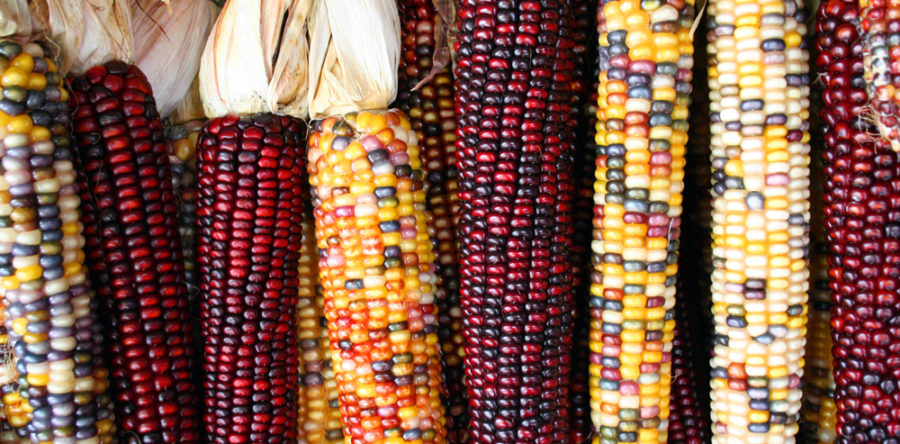Lessons from Mexico to Canada: GM Crops as Threats to Indigenous Ways of Life
A legal battle over GMO crops in Mexico may shed light on how Canada will interpret Aboriginal and Treaty rights as they relate to economic and agricultural activity on land subject to those rights.
Glyphosate is a powerful herbicide. It was developed into a commercial product called Roundup by Monsanto in the 1970s, and made even more popular when Monsanto introduced a line of genetically modified seed that was resistant to glyphosate, allowing farmers to kill weeds without killing their crops.
Amid growing international concern about the potentially carcinogenic effects of glyphosate, the Indigenous Mayan peoples of Mexico and Mexican government authorities have expressed concern about the proliferation of these genetically-modified glyphosate-resistant crop strains.
Maize
Before 2009, there was a moratorium on genetically modified (GM) maize in Mexico. In 2009, the Federal Government reversed course and approved growth of GM crops. In 2013, Judge Jamie Eduardo Verdugo J. of the Twelfth Federal District Court for Civil Matters of Mexico City suspended authorizations to plant GM maize seeds. The judge ordered Mexico’s Secretary of Agriculture and the Secretaria de Medio Ambiente y Recoursos, the equivalent of Environment and Climate Change Canada or the American EPA, to “suspend all activities involving the planting of transgenic corn in the country and end the granting of permission for experimental and pilot commercial plantings.” In 2015, this decision was overturned after 93 appeals by the biotech industry.
Soy and Bees
In March 2014, a judge of the Second District Court in Campeche ruled that the government ministries of SAGARPA and SEMARNAT must guarantee that no GM soy will be grown in the state of Campeche, effective March 7, 2014. This decision was made – and this is key – on the basis that authorization to trade GM soy violates Indigenous peoples’ constitution rights to prior informed consultation and right to decide what grows on their land. Three Mayan communities from the Hopelchen township sued the Ministry of Agriculture, Livestock, Rural Development, Fisheries and Food, (SAGARPA) and SEMARNAT after the two ministries permitted the release of Monsanto’s Roundup-Ready GM soybeans into the environment via planting of 253 000 hectares in seven of Mexico’s states. The Mayan communities alleged that planting GM soybeans affected the traditional historical practices of the Indigenous people – including beekeeping. Beekeeping in Maya communities is an activity that has been passed on through the generations and can be traced back centuries. The Mayan beekeepers have tended stingless bees for more than a thousand years and Mayan glyphs anointing bees as strong relations are as ancient as the oldest stelas. The decision means that SAGARPA now has an obligation to ensure that the GM soybeans are not planted in the state of Campeche.
In July 2014, a district judge in Yucatan overturned a permit issued to Monsanto by SAGARPA and SEMARNAT in June of 2012. This permit had approved commercial planting of Monsanto’s Roundup-ready soybeans in seven Mexican states without prior consultation with the Indigenous peoples from these states. Scientists, farmers, beekeepers and Mayan authorities argued that GM soy and honey production are incompatible. In support of their case, the Mayan beekeepers pointed out that “85 percent of Mexican honey is exported to European Union (EU) markets and the Court of Justice of the EU already prohibits (as of 2011) the sale of honey containing pollen from GM crops.” The judge agreed that GM soy planting threatens Mexican honey production in the states of Campeche, Quintana Roo and Yucatan and found that [co-existence between honey production and GM soybeans is not possible].
In July 2016, a coalition of NGOs filed a complaint with the Inter-American Commission on Human Rights (IACHR) on behalf of Mayan communities. This complaint asked the Commission to urge the Mexican government take precautionary measures to preventing planting of GM soy in Campeche and Yucatan, on the basis that the health and way of life of the Mayan people are put at risk by the planting and use of Roundup-Ready soy and glyphosate, the active ingredient in Roundup. A representative of the Mayan communities, Leydy Pech noted that
[b]ecause of the cultivation of soy on our lands, we have lost medicinal plants, vital trees for local bee populations, and animals, and have even seen some of our archaeological sites destroyed. This harms our Mayan identity and denies us the possibility of passing that knowledge on to our children; traditional knowledge that allows us to preserve the forest and generate well-being for our communities.
How a similar court case would proceed in Canada is still unclear. While the Supreme Court of Canada has recently affirmed the importance of the Crown’s duty to consult on any matters (more often than not, related to resource extraction) that impact the interests of Indigenous peoples, Canada’s jurisprudence on this matter tends to reflect a sliding scale – matters that only “minimally” impact Indigenous rights require little more than formal notice and information disclosure, while matters that strike at the heart of Indigenous rights typically require fully informed consent. Could the planting and/or cultivation of genetically modified crops on traditional Indigenous territories rise to this level? Perhaps one day courts in Canada will follow the logic of the Mexican courts and require free, prior, and informed consent whenever Indigenous people’s lands are used by any outside actor. The current federal government has committed to the full implementation of the United Nation’s Declaration on the Rights of Indigenous peoples, which includes (via Article 19) language to this effect. With its stated commitment to reconciliation with its Indigenous peoples, how Canada chooses to implement the UNDRIP Article 19 provision on free, prior, and informed consent will speak volumes as to the true character of this commitment. If the recent court decisions in Mexico are any indication, the stakes for Indigenous peoples are high.






